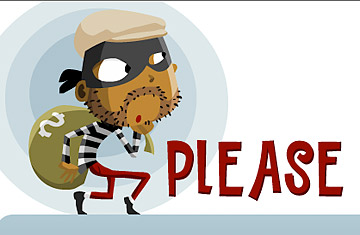
Think before you tweet. You might not be aware of how much information you're revealing.
That's the message from the founders of Please Rob Me, a website launched on Tuesday that illustrates just how easy it is to rob people blind on the basis of the information they're posting on the Web. The site uses streams of data from Foursquare, an increasingly popular location-based social network that is based on a game-like premise. Players use smart phones or laptops to "check in" to a location, recording their position on a map for friends using the service to see. The more often you check in, the better your chances of being declared the mayor of a particular location, be it a restaurant, bar, office or even your own home.
The problem comes when users also post these locations to Twitter, says Boy van Amstel, one of the founders of Please Rob Me. Then the information becomes publicly available, making it theoretically possible for a robber (or anyone else) to keep tabs on when you say you're in your home or not.
"We saw people checking in at their home addresses, or even worse, those of their friends and family," van Amstel says. "Which we just thought was very wrong."
Van Amstel is no expert hacker, and Please Rob Me isn't a complicated website; it's simply a dressed-up page of Twitter search results that monitors the latest posts of users sharing their locations via Foursquare. And there are a lot of results — thousands of people willingly broadcast when they're not at home (it's rarer for users to post to Foursquare when they return). A select, misguided few broadcast their address or those of unknowing and disapproving friends or family. This makes the site more useful at proving a point than an actual tool for robbers to exploit.
But there will only be more opportunities for users to overshare. The success of Foursquare (the site has more than 150,000 users) has spawned a series of imitators. The popular review site Yelp recently enabled a similar functionality in its mobile application, and Facebook may soon add location-sharing too.
So how can you keep yourself off Please Rob Me and, more important, keep your home out of the police blotter? A little foresight goes a long way. Sites like Foursquare and its competitors don't post your location unless you give it to them, nor is it posted to Twitter without your consent. It's always up to the user to decide what to post. Are you going to get robbed because you're oversharing? It's unlikely. But if nothing else, Please Rob Me shows that sometimes a little discretion online can go a long way.
